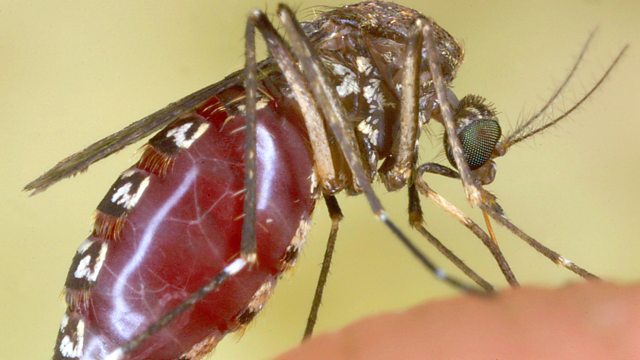
Malaria Control
Malaria control; Scarlet fever outbreaks; Strong prehistoric women; Axolotl; Synthetic biology; “Pimp my Zimmer”; Election cyber-security; Sibling rivalry
The World Malaria Report 2017 draws on data from 91 countries and areas with ongoing malaria transmission. This year's report shows that after an unprecedented period of success in global malaria control, progress has stalled. In 2016, there were an estimated 216 million cases of malaria, an increase of about 5 million cases over 2015. Deaths reached 445,000, a similar number to the previous year. Science journalist Dr Claire Ainsworth explains.
Scarlet Fever Outbreaks
In 2016 the infectious disease scarlet fever hit its highest level in 50 years in England and there are also epidemics in Hong Kong, South Korea and parts of China which show no signs of letting up. Dr Theresa Lamagni, head of streptococcal surveillance at Public Health England, talks about the outbreaks with Claudia Hammond.
Prehistoric Women’s Arms
Grinding grain for hours a day gave prehistoric women stronger arms than today's elite female rowers, a study says. The discovery points to a ''hidden history'' of gruelling manual labour performed by women over millennia, say University of Cambridge researchers. Dr Alison Macintosh talks to Adam Rutherford about how the study is the first to compare prehistoric female bones to those of living women.
Axolotl
This species of salamander is a wonder of nature. It's the amphibian that never grows out of its larval stage yet it is able to reproduce. Most remarkable is its ability to regrow limbs, which is of great potential interest to researchers developing regenerative medicine. There are many thousands of axolotls in labs and homes around the world. But in the wild, in their native Mexico, they are on the very edge of extinction. Conservation biologist Richard Griffiths of the University of Kent and axolotl researcher Tatiana Sandoval Guzman of the Technical University in Dresden, Germany explains.
Synthetic Biology
What does the future hold for synthetic biology? Who will be the practitioners of this fast-growing branch of bioengineering and what will be its impact on the world - for good and possibly ill? Experts in the field have just published a horizon-scanning report in the journal eLife. One of the scientists involved, Floyd Romesberg of the Scripps Research Institute in California, talks to Roland Pease.
Pimp My Zimmer
Schoolchildren in the UK are helping older people decorate their walking frames, known as Zimmer frames, to make them a bit more beautiful. It’s to try and reduce the number of falls, which are common in the elderly. Bobbie Lakhera reports from a care home in Wales taking part in the “Pimp My Zimmer” project.
Election Security
The robustness of democratic elections continues to be questioned. Gareth Mitchell talks to Debora Plunkett, formerly of the US National Security Agency, and now at the Belfer Center for Science and International Affairs, about efforts to prevent future hacking during US elections.
Sibling Rivalry
We tend to think of sibling rivalry as something that is inevitable – and not good. But in her new book, Siblings, clinical psychologist Linda Blair says there can be benefits. She tells Claudia Hammond how parents should deal with sibling rivalry.
(Photo caption: The body of a female mosquito fills up and balloons as she sucks blood from a hand – credit: Getty Images)
The Science Hour was presented by Gareth Mitchell with comments from freelance science journalist, Dr Claire Ainsworth
Producer: Katy Takatsuki
Last on
More episodes
Previous
Next
Broadcast
- Sat 2 Dec 2017 12:06GMT���˿��� World Service Americas and the Caribbean
Podcast
-
![]()
Unexpected Elements
The news you know, the science you don't

